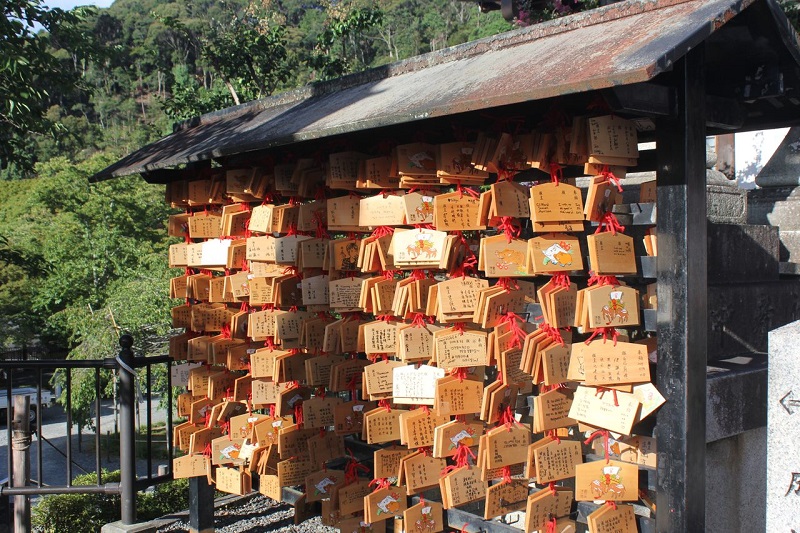
Kansai
La région de Kansai était le centre du Japon jusqu’en 1868. Les villes historiques comme Kyoto ou Nara se trouvent dans cette préfecture.
-

Sanctuaire de Yasaka
Located in the famous Gion district in Kyoto, the Yasaka Shrine, founded more than 1350 years ago, stands out for its great beauty and its great buildings.
-

Gare d’Osaka
Located in the bright and modern shopping complex of Osaka Station City, Osaka Station is the largest and busiest station in western Japan.
-

Temple Kiyomizu dera 清水寺
Le temple Kiyomizu-dera, célèbre grâce à sa terrasse, est situé dans la partie est de Kyoto à Higashiyama. Il a été classé au patrimoine mondial de l’UNESCO en 1994 parmi les monuments historiques de l’ancienne de Kyoto.
-

Coin de Gion
Seven types of traditional Japanese performing arts can be comfortably enjoyed in about an hour in the heart of the Gion district of Kyoto.
-

Dotonbori 道頓堀
La zone de divertissement animée de Dotonbori est la destination touristique la plus célèbre d’Osaka. Elle est réputée pour ses néons frappants, sa signalisation extravagante et l’immense variété de restaurants et de bars.
-

Forêt de kimonos
In Kyoto, there is peculiar place that honors the designs of Japanese beautiful garment, kimono. The place is known as « The Kimono Forest ».
-

Sumiyoshi Taisha
The Shinto shrine « Sumiyoshi Taisha » was founded in 211, being one of the oldest shrines in all of Japan. It is dedicated to Sumiyoshi sanjin.
-

Sanctuaire Imamiya Ebisu
Imamiya Ebisu is the most famous among the small shrines of Osaka. Located in Naniwa, this sanctuary is dedicated to God Ebisu, God of fishermen and commerce.
-

Umeda Sky Building
As one of the best examples of artistic beauty with state-of-the-art technology, there is the “Umeda Sky Building” tower, a short distance from Osaka station.
-

Château d’Osaka 大阪城
Le château d’Osaka est le symbole de la ville d’Osaka. Ses immenses remparts faits de grands rochers sont à voir.
-

Kumano Kodo
Kumano Kodo is pilgrimage routes in the Kii Mountains. The routes radiate centering around Kumano Three Shrines; Hongu, Hayatama and Nachi.
-

Ville de Kobe
Kobe is the capital of Hyogo Prefecture. Located between the sea and the Rokko mountain range, Kobe is considered one of Japan’s most attractive cities.
-

Histoire d’Osaka
Since time immemorial, Osaka has been a place where people from near and far regions meet. It sits in the Inland Sea of Seto, a busy water area.
-

Musée national de Nara
Nara National Museum is located in Nara Park where there are also some famous temples such as Todaiji Temple and Kohukuji. It exhibit mainly Buddhist art.
-

Temple Horyuji
Horyu-ji was founded in 607 by Prince Shotoku. The temple has the oldest wooden buildings in the world. Hōryū-ji was inscribed as a UNESCO World Heritage Site.
-

Temple Kofukuji
Kofukuji Temple was moved here from Kyoto to Nara in 710 (the year when the capital was moved to Nara) as the main temple of the Fujiwara family.
-

Sanctuaire de Kasuga Taisha 春日大社
Le Sanctuaire de Kasuga Taisha est situé à l’est du parc de Nara, au pied de deux monts sacrés : le mont Kasuga yama et le mont Mikasa yama.
-

Temple Todai-ji 東大寺
Todaiji Temple, located in the famous Nara Park, has Great Buddha and the world’s largest wooden structure. It was originally constructed in the 8th century.
-

Temple Byodo-in 平等院
Le Temple Byodo-in est l’une des plus belles costructions de l’époque Heian.
-

Kodaiji Temple
Kodaiji Temple is located in Higashiyama. It was founded in 1605 by Kita-no-Mandokoro as a memorial to her husband, Toyotomi Hideyoshi.